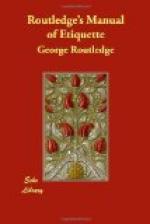If the gentleman be a person of good breeding and right feeling, he will need no caution from us to remember that, when he is admitted into the heart of a family as the suitor of a daughter, he is receiving one of the greatest possible favours that can be conferred on him, whatever may be his own superiority of social rank or worldly circumstances; and that, therefore, his conduct should be marked by a delicate respect towards the parents of his lady-love. By this means he will propitiate them in his favour, and induce them to regard him as worthy of the trust they have placed in him.
Young people are naturally prone to seek the company of those they love; and as their impulses are often at such times impatient of control, etiquette prescribes cautionary rules for the purpose of averting the mischief that unchecked intercourse and incautious familiarity might give rise to. For instance, a couple known to be attached to each other should never, unless when old acquaintances, be left alone for any length of time, nor be allowed to meet in any other place than the lady’s home—particularly at balls, concerts, and other public places—except in the presence of a third party. This, as a general rule, should be carefully observed, although exceptions may occasionally occur under special circumstances; but even then the full consent of the lady’s nearest relatives or guardians should be previously obtained.
What the Lady should observe during Courtship.
A lady should be particular during the early days of courtship—while still retaining some clearness of mental vision—to observe the manner in which her suitor comports himself to other ladies. If he behave with ease and courtesy, without freedom or the slightest approach to licence in manner or conversation; if he never speak slightingly of the sex, and be ever ready to honour its virtues and defend its weakness; she may continue to incline towards him a willing ear. His habits and his conduct must awaken her vigilant attention before it be too late. Should he come to visit her at irregular hours; should he exhibit a vague or wandering attention—give proofs of a want of punctuality—show disrespect for age—sneer at things sacred, or absent himself from regular attendance at divine service—or evince an inclination to expensive pleasures beyond his means, or to low and vulgar amusements; should he be foppish, eccentric, or very slovenly in his dress; or display a frivolity of mind, and an absence of well-directed energy in his worldly pursuits; let the young lady, we say, while there is yet time, eschew that gentleman’s acquaintance, and allow it gently to drop. The effort, at whatever cost to her feelings, must be made, if she have any regard for her future happiness and self-respect. The proper course then to take is to intimate her distaste, and the causes that have given rise to it, to her parents or guardian, who will be pretty sure to sympathise with her, and to take measures for facilitating the retirement of the gentleman from his pretensions.




